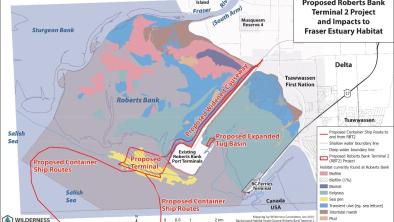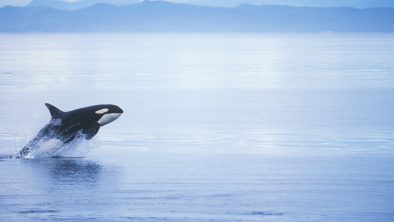Canada Sued for Failure to Protect Killer Whale Habitat
Environment News Service
VANCOUVER, British Columbia - The federal Department of Fisheries and Oceans was sued today by six environmental groups from across Canada for failure to safeguard the critical habitat of killer whales that reside in British Columbia coastal waters.
The lawsuit alleges that the department has failed to protect the critical habitat of two populations of marine mammals that inhabit British Columbia waters - the endangered southern resident killer whales and the threatened northern resident killer whales - both formally listed under the Species at Risk Act.
"This is the first lawsuit ever of its kind in Canada," said Lara Tessaro, staff lawyer at Ecojustice, the law firm representing the plaintiff groups. "We hope to force the federal government to legally protect the critical habitat of endangered species like the southern resident killer whales."
Killer whales, also known as orcas, are long-lived members of the dolphin family and top predators in the marine food web. In the Northeast Pacific Ocean, biologists classify killer whales into three distinct groups - resident, transient, and offshore.
The critical habitat of the southern resident killer whale population includes the waters around the San Juan and Gulf Islands, and up Georgia Strait about mid-way up Vancouver Island. The occurrence of the southern resident whales in this area is correlated with the timing of salmon migration through these waters, as salmon is their primary food source.
The critical habitat of the northern resident killer whale population includes the waters of Johnstone Strait and southeastern Queen Charlotte Strait, and the channels connecting these straits.
On September 10, without consulting killer whale scientists, the Department of Fisheries and Oceans declined to issue an order under the federal Species at Risk Act to protect the resident killer whales’ critical habitat from destruction.
The department issued a statement claiming that resident killer whale critical habitat is protected by existing laws and policies.
These killer whales are attempting to survive despite decreasing numbers of salmon; increased boat traffic; toxic contamination; and noise from dredging, seismic testing and military sonar.
Frustrated by the federal government’s failure to take steps under the Species at Risk Act to protect the orcas, the David Suzuki Foundation, Environmental Defence, Greenpeace Canada, the International Fund for Animal Welfare, the Raincoast Conservation Society and the Wilderness Committee have turned to the courts.
"Department of Fisheries and Oceans' decision not to protect critical habitat of resident killer whales is symptomatic of the federal government’s widespread failure to implement the Species at Risk Act," said Gwen Barlee, policy director of the Wilderness Committee. "BC’s endangered species deserve better."
Bill Wareham, senior marine conservation specialist at the David Suzuki Foundation, said, "To truly protect killer whales’ critical habitat, Canada needs to legally protect areas that serve the killer whales’ basic needs for food and rest. Comprehensive marine use plans that include new protected areas are essential, if we hope to recover populations of these magnificent whales."
Between 1993 and 2003, the southern resident killer whale population fell by about 20 percent. In the mid-1990s, there were approximately 95 animals, but now numbers have fallen to about 85.
The northern resident population numbers about 220 animals.
The lawsuit follows a two-year struggle by the Resident Killer Whale Recovery Team - independent scientists and government scientists tasked with preparing a Recovery Strategy for these orcas - to ensure that the recovery plan included information showing the orcas’ critical habitat.
Orca expert Dr. Lance Barrett-Lennard, co-chair of the Resident Killer Whale Recovery Team, has said that the team resisted multiple attempts by senior government officials to remove critical habitat and other scientific information from the Resident Killer Whale Recovery Strategy prior to its completion.
The Final Recovery Strategy for the Northern and Southern Resident Killer Whales was released by Fisheries and Oceans Canada on March 14, 2008. It identified and mapped some areas that are critical habitat for resident killer whales, and suggested other areas that, with further research, may also be identified as critical habitat, but these areas have not been protected.
Copyright Environment News Service (ENS) 2008. All rights reserved.


